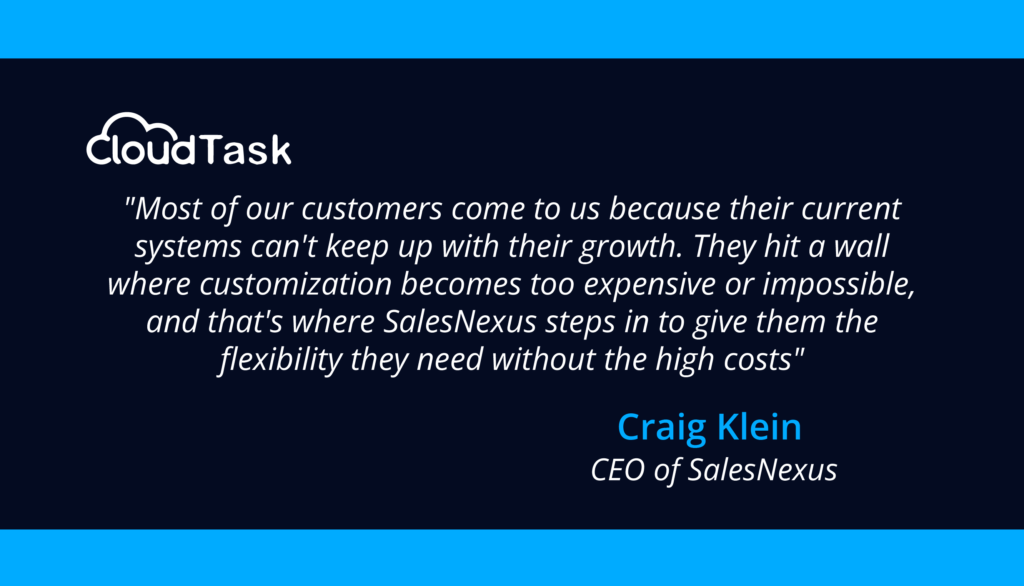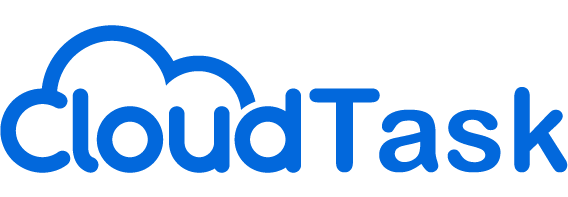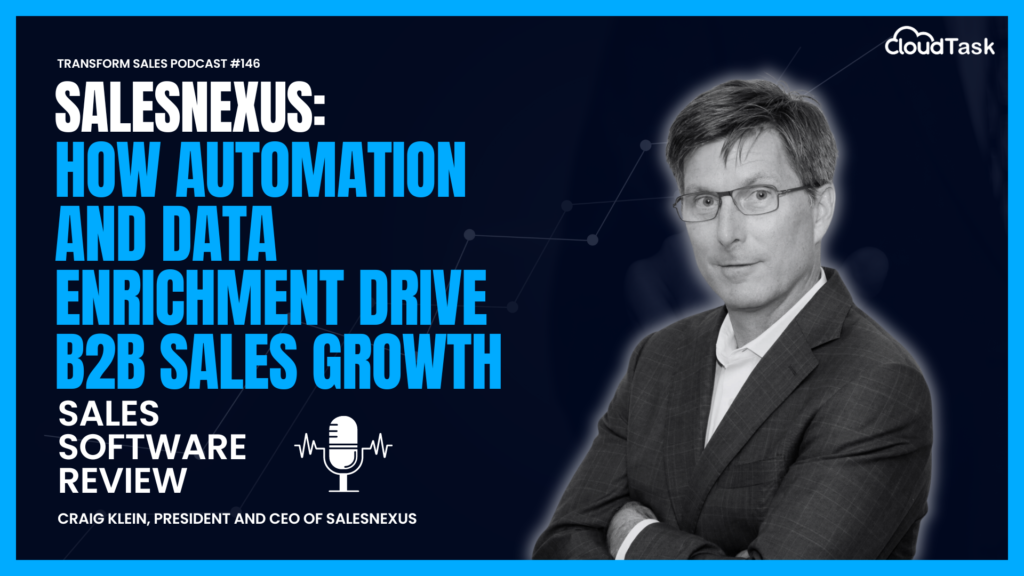In this episode of the Transform Sales Podcast: Sales Software Review Series, host Eddie Bello interviews Craig Klein, CEO of SalesNexus, a CRM software built for B2B sales teams in small to medium-sized businesses (SMBs).
SalesNexus is best suited for companies with revenue ranging from $5 million to $50 million that rely on their sales teams to drive growth without the support of large IT or marketing departments.
Craig shares how the platform simplifies lead management, automates dynamic email marketing, and helps sales teams focus on client relationships by streamlining routine tasks.
Let’s explore the key takeaways from the conversation and how SalesNexus can optimize the sales pipeline for growing businesses.
When it comes to optimizing the sales pipeline process, what alternatives were your customers most often using before buying your software?
Before switching to SalesNexus, many SMBs relied on other CRM solutions or manual processes to manage their sales pipelines.
Here are three common alternatives:
- HubSpot: HubSpot is a widely used CRM tool for smaller companies, appreciated for its user-friendly interface. However, as businesses grow, they often find HubSpot’s advanced features too expensive, especially for automation and reporting, which can limit scalability.
- Pipeline Deals: Another popular option is Pipeline Deals, which offers basic sales pipeline management, but many SMBs find it too rigid for complex sales processes. Pipeline Deals is designed for simpler workflows and often doesn’t provide the customization that growing teams require.
- Manual Tracking with Spreadsheets: For many SMBs, managing their sales pipeline using Excel or Google Sheets is common. This approach can be practical in the early stages but quickly becomes inefficient as the company scales, leading to missed opportunities and disorganized data.
What challenges were your customers running into that your software helped them overcome?
Customers who switched to SalesNexus faced several major challenges with these alternatives:
- Customization Limitations: Tools like HubSpot and Pipeline Deals are designed for simpler workflows. Many SMBs struggle with customizing these platforms to fit their unique sales processes. 57% of CRM users report challenges with customizing CRMs to meet their needs. SalesNexus provides greater flexibility, allowing users to tailor the platform to their exact requirements.
- Inefficient Workflow Management: Recent data says that 39% of small businesses cite inefficient processes as a key barrier to growth. SalesNexus helps streamline workflows by automating lead management and follow-ups, giving sales teams more time to focus on customer interactions.
- Cost Scalability: As companies grow, the cost of adding advanced features to platforms can quickly escalate. The platform offers a more affordable solution with a comprehensive feature set, allowing SMBs to scale without significant increases in CRM expenses.
Craig Klein further explains the common frustrations SMBs experience with alternatives, stating:

What are the key features of SalesNexus that help overcome the challenges of optimizing the sales pipeline?
SalesNexus is packed with features tailored to tackle the most pressing challenges SMB sales teams face, but what really sets it apart?
Here’s how it helps businesses overcome these challenges and drive more efficient sales processes.
Customizable CRM Workflows
One of the biggest challenges for SMBs using alternatives like HubSpot or Pipeline Deals is the lack of flexibility in customizing workflows.
SalesNexus solves this by allowing teams to create fully customizable reports and dashboards. This flexibility enables SMBs to align the CRM with their unique sales process, without needing extensive IT resources or external consultants.
Craig highlights this as a core advantage:
“So you really customize these graphs from the from the ground up. And again, it’s not something that you need a programmer to do. You don’t need a consultant to do that. You can do it yourself.”
Lead Enrichment and Management
Many CRM platforms either charge extra based on the number of contacts or fail to offer robust data enrichment features.
SalesNexus addresses this with unlimited contact management and built-in lead enrichment tools. Sales teams can automatically fill in missing contact information, such as phone numbers or job titles, making it easier to engage with prospects.
Integrated Email Marketing Automation
Effective email marketing can be resource-intensive for SMBs, particularly when their CRM tools limit the number of emails they can send or lack automation features.
SalesNexus overcomes this by providing dynamic email marketing tools that allow users to send up to 20,000 emails monthly. It also offers AI-driven content generation, making it easy for teams to create personalized email campaigns quickly.
What tasks, deliverables, and/or people need to be involved in setting up SalesNexus for this use case, and how long does it typically take to reach full productivity?
Setting up SalesNexus for SMB sales teams requires a few key deliverables, personnel, and tasks to ensure a smooth onboarding process and quicker productivity gains.
Here’s what typically needs to be in place:
Preparation and Key Deliverables
Before implementing SalesNexus, businesses should have their sales processes mapped out.
As Craig Klein emphasizes,
“If you know what you want your process to be, SalesNexus can be customized around that without needing a whole bunch of programmers or consultants to do it for you”.
Key deliverables include:
- A well-documented sales process: Outlining every stage of the sales cycle and qualifying criteria helps in aligning the system to your unique sales approach.
- Data Backup: Migrating data such as leads, sales opportunities, and customer notes is crucial. Craig explains that SalesNexus offers CRM migration packages to map, load, and adjust this data to fit their platform.
- Sales Team Readiness: Sales reps need to be knowledgeable of SalesNexus’ functionalities to fully use its features, such as automated follow-ups and customized reporting dashboards.
Personnel Involved
While implementing SalesNexus doesn’t require extensive technical expertise, key players involved should include:
- Sales Leaders and Teams: As primary users, they’ll need training on how to go through the CRM, log customer interactions, and use lead nurturing features.
- Marketing Teams: Since SalesNexus integrates email marketing automation, marketers play a role in aligning messaging and lead scoring.
- IT or CRM Managers (Minimal Involvement): While SalesNexus manages most of the implementation, IT teams may help integrate external tools for a seamless process.
Time to Full Productivity
Typically, businesses can expect to reach full productivity within 1-2 weeks.
Craig highlights how SalesNexus minimizes downtime by providing a turnkey implementation package. This package costs around $3,000, which is significantly more affordable than alternatives like Salesforce, which may charge up to $10,000.
What KPIs should SMB sales teams use to evaluate their success with SalesNexus for optimizing the sales pipeline process, and what quantifiable outcomes can they expect?
For SMBs using SalesNexus to optimize their sales pipeline, it’s essential to track specific KPIs that align with pipeline growth and sales productivity.
The most relevant KPIs include:
- Meetings Booked: SalesNexus automates outreach and follow-ups, increasing the number of meetings booked with qualified leads. Craig emphasizes that one of SalesNexus’s primary goals is to get sales reps talking to more prospects.
- Response Rates: SalesNexus enables automated, personalized email campaigns that improve engagement rates. Tracking the open rates and responses to these campaigns helps gauge the marketing automation system’s effectiveness.
- Time Spent on Qualified Prospects: Craig mentions that the platform helps sales reps “spend more time talking to qualified prospects instead of researching, instead of writing emails and all the busywork.” Track the amount of time salespeople spend directly engaging with potential customers.
- Pipeline Growth: By managing and tracking every interaction within the CRM, SalesNexus provides teams with a clear view of how their pipeline is expanding. Over time, businesses can expect to see improvements in lead conversion and overall sales pipeline metrics.
Final Thoughts
Craig Klein shared how SalesNexus helps SMBs tackle challenges with customization, lead management, and scaling their sales processes affordably.
With features designed to improve workflow efficiency and reduce manual tasks, SalesNexus enables sales teams to focus more on selling and less on admin work. If you’re looking for a CRM that simplifies operations and drives growth, SalesNexus is worth considering.











